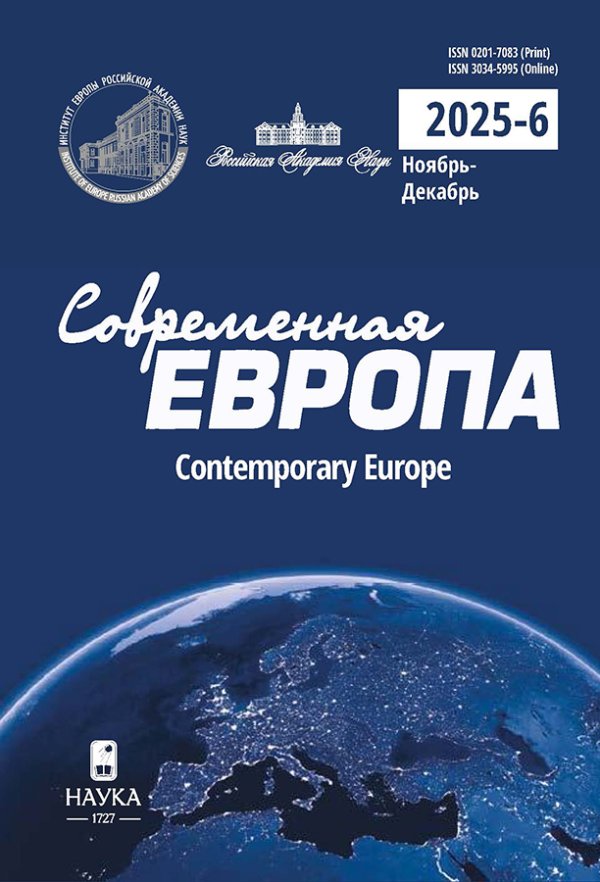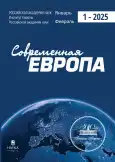GEOPOLITICAL CONFLICT BETWEEN GREAT POWERS IN THE 21ST CENTURY: ANALYSIS OF THE UKRAINIAN CRISIS
- Авторы: KIET L.H1, HIEP T.X1
-
Учреждения:
- Выпуск: № 1 (129) (2025)
- Страницы: 121-135
- Раздел: ПРОБЛЕМЫ БЕЗОПАСНОСТИ
- URL: https://journal-vniispk.ru/0201-7083/article/view/292067
- DOI: https://doi.org/10.31857/S0201708325010103
- ID: 292067
Цитировать
Аннотация
The Ukrainian crisis is not just an armed conflict between two nations, but also reflects the geopolitical competition between great powers in the 21st century. This paper will analyze the deep-rooted origins leading to the military conflict through a geopolitical lens, delving into the long process of historical tensions and confrontation between Russia and the West represented by the North Atlantic Treaty Organization (NATO) regarding the issue of Ukraine. The study will explore Russia’s geostrategic motives in starting special military operation in Ukraine, NATO’s efforts to expand its influence into this region, as well as the complex developments that caused the conflict to escalate into the largest armed war since the beginning of the 21st century. Through this, the paper analyzes the profound nature of the geopolitical crisis in Ukraine in the context of the power struggle between major powers in this strategic region; provide a comprehensive view of the motives, strategies of the parties involved, as well as the far-reaching implications this conflict has caused for security in the European region. In doing so, it contributes to a better understanding of the complex nature of geopolitical conflict and security in the 21st century.
Ключевые слова
Об авторах
L. H KIET
Автор, ответственный за переписку.
Email: kietnckh1999@gmail.com
ORCID iD: 0009-0002-9968-1952
T. X HIEP
Email: txhiep@ued.udn.vn
ORCID iD: 0000-0002-5236-993X
Список литературы
- Ahmed, S., Assaf, R., Rahman, M.R., & Tabassum, F. (2023). Is geopolitical risk interconnected? Evidence from Russian-Ukraine crisis. The Journal of Economic Asymmetries, 28(1). https://doi.org/10.1016/j.jeca.2023.e00306
- Brzezinski, Z. (2019). Bàn cờ lớn [The Grand Chessboard]. Hanoi: Omega Plus Publishing House.
- D’Anieri, P. (2012). Ukrainian foreign policy from independence to inertia. Communist and Post-Communist Studies, 45(3), pp. 447‒456. https://doi.org/10.1016/j.postcomstud.2012.06.008
- Dodds, K., & Taylor, Z., & Akbari, A., & Broto, V.C., & Detterbeck, K., & Inverardi-Ferri, C., & Woon, C.Y. (2023). Territory-Politics-Governance, 11(8), pp. 1519‒1536. https://doi.org/10.1080/21622671.2023.2256119
- Geneuss, J., & Jeberger, F. (2022). Journal of International Criminal Justice, 20(4), pp. 783‒786. https://doi.org/10.1093/jicj/mqac055
- Hong, D.M., & Hiep, L.H. (2018). Thuật ngữ Quan hệ Quốc tế [International Relations Terminology]. Hanoi: National Political Truth Publishing House.
- Kaplan, R.B. (2018). Sự minh định của địa lý [The Revenge of Geography]. Hanoi: Writers Association Publishing House.
- Kiet, L.H. (2024). Mục tiêu chiến lược của Hoa Kỳ thông qua xung đột Nga-Ukraine [America’s strategic goals through the Russia-Ukraine conflict]. Vietnam Journal of World Economics and Politics, 4(16), pp. 53‒66.
- Khudoley, K.K. (2023). Европа в кризисном мире: нарастающие проблемы без однозначных решений [Europe in the Crisis World: Pressing Issues, Unobvious Solutions]. Contemporary Europe - Sovremennaya Evropa, 6, pp. 204‒216. doi: 10.31857/S0201708323060177
- Kiet, L.H., & Tuyen, N.V. (2023). Vị trí địa chính trị Việt Nam đối với Hoa Kỳ trong chiến lược ngăn chặn tham vọng bá quyền của Trung Quốc [Vietnam’s geopolitical position with the United States in preventing China’s hegemonic ambitions]. Danang Journal of Science and Technology, 21(8.1), pp. 63‒69. https://jst- ud.vn/jst-ud/article/view/8630/5950
- Marshall, T. (2020). Tù nhân địa lý [Prisoners of Geography]. Hanoi: Writers Association Publishing House.
- Mearsheimer, J.J., & Walt, S.M. (2016). The Case for Offshore Balancing: A Superior US Grand Strategy. Foreign Affairs, 19(4), pp. 70‒83. https://www.jstor.org/stable/43946934
- Vakarchuk, D.O., & Ivoninskaia, A.A. (2024). Влияние российско-украинского кризиса на позиции немецких партий по проблеме энергетического перехода [Impact of the Russian-Ukrainian Crisis on the Approaches of German Parties towards Energy Transition]. Contemporary Europe - Sovremennaya Evropa, 2, pp. 57‒69. doi: 10.31857/S0201708324020050
- Raik, K., Blockmans, S., Osypchuk, A., & Suslov, A. (2024). EU Policy towards Ukraine: Entering Geopolitical Competition over European Order. The International Spectator, 59(1), pp. 39‒58. https://doi.org/10.1080/03932729.2023.2296576
- Shyrokykh, K. (2018). The Evolution of the Foreign Policy of Ukraine: External Actors and Domestic Factors. Europe - Asia Studies, 70(5), pp. 832‒850. https://doi.org/10.1080/09668136.2018.1479734
- Tuan, N.A. (2022). Chính sách đối ngoại của Ukraine từ năm 1991 đến nay [Ukraine’s foreign policy from 1991 to present]. Hanoi: Truth National Political Publishing House.
Дополнительные файлы










